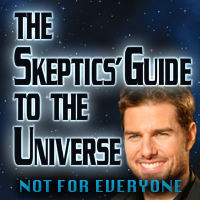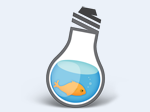Jack Aubrey a sceptic?
I have had, for as long as I remember, a deeply rooted confidence in science and a corresponding lack of faith in religion. Recently I have found that there exists a like minded group of individuals whose world view very neatly fits my own.
The Skepticism movement is a somewhat eclectic group of people with a common belief in the importance of science and reason. I hadn't realized that there were people actively promoting this kind of thinking (and the importance of doing so) until I began listening to the popular Skeptics Guide to the Universe podcast:

My experience of The Skeptics' Guide has been a liberating one. It has led me to re-examine some of the irrational beliefs, which I had held quite strongly, and taken away much of the uncertainty that had plagued my perception of the world around us.
I feel like a Skeptical world view, rather having the negative connotations of cynicism, is a compassionate and hopeful one that is not driven by our very human ability to frighten ourselves with the unknown.
I was delighted to discover, while reading The Surgeon's Mate for my Mapping Project, Jack Aubrey having a moment of sceptical clarity in response to Mr Pellworm's lamentation of departing on Friday the thirteenth (and with a woman on board for all love):
'No, no: your omens keep threatening disaster - they did so before Grimsholm, and you see what happened: all cry with no wolf at the end of it. I have done with omens,' he said, grasping a belaying-pin. 'But your falling glass is another kettle of fish: your glass is scientific.'
Another kettle of fish indeed.
Permalink - Comments - Tags: Patrick O'Brian
Questions and Answers

I am a strong believer in the importance of constantly exercising and expanding my skillset as a programmer. I think it is pretty common that the range of tasks encounted during a normal work day will not nessasarily provide the breadth of problem domains to satisfy this desire. So I have often found myself embarking on grand, sometimes fataly flawed, personal projects.
Over the past few months, I found a new outlet for these random bursts of creativity:
Stack Overflow
Stack Overflow is a programming Q & A site that's free. Free to ask questions, free to answer questions, free to read, free to index, built with plain old HTML, no fake rot13 text on the home page, no scammy google-cloaking tactics, no salespeople, no JavaScript windows dropping down in front of the answer asking for $12.95 to go away. You can register if you want to collect karma and win valuable flair that will appear next to your name, but otherwise, it's just free. And fast. Very, very fast.
Yes! Yes, I want to win valuable flair. Badges are shiney and precious and I want them. These guys certainly know their demographic. There are a few things about Stack Overflow that I find ridiculously addictive:
- Badges - It's slightly embarressing but apparently I have a weakness for U+25CF.
- A couple of points of virtual self validation - I have a history of performing meaningless tasks to accrue self worth in arbitrary point systems. Stack Overflow taps right into that insanity and thankfully generates some positive behavior.
- Inherent Value - Investigating and solving programming problems is very good practice. When this practice adds to a large pool of useful answers, the value here is undeniable.
- I like to write - I don't think I am particularly good at it, but I think the only way to get better is to do it a lot. Stack Overflow provides a peer reviewed testing ground for clear expression. I can practice my writing without having to resort to inane, self indulgent Blog posts like this one.
So I enjoy answering programming questions. What I didn't realise was that this, primarily ego driven, exercise translates to other domains. The 'How is Babby Formed' phenomena warned me away from looking at Yahoo Answers, but there are some great competitors in this space:
Mahalo
Mahalo is a human-powered search engine dedicated to help people easily find information and resources they can trust.
Mahalo was created as the Human Powered Search Engine. Basically thousands of user contributed pages tied to traditional Google text, image and video search results. Each page is ad supported and a percentage of the revenue is paid to the page author in Mahalo's virtual currency (which can be eventually be converted to US dollars).
In the last few months Mahalo has added Q&A to this core set of functionality. Users can ask questions on any topic and Mahalo members can answer those questions to earn points and Mahalo dollars. As with any Q&A system that is open to questions on any topic, there is a certain amount of noise, but in general the questions are reasonably good. I don't find the virtual currency very compelling but, as with Stack Overflow, I am a sucker for earning points.
Aardvark
Aardvark was conceived as the first Social Search engine: a way to find people, not web pages, that have specific information.
Aardvark is based on the premise that your social network is a great place to start to find answers to your questions. Without a points system, or indeed any motivation outside altruism, I haven't felt the same compulsion to answer questions. I have found it very useful for finding answers. Because Aardvark actively scans your network and pings other users for answers to your questions, if an answer can be found, it generally finds it very quickly.
I don't really understand what motivates the helpful people who have promptly answered some of my Aardvark questions, but I am very grateful that the service exists. I wonder about its longevity, but hope that its success continues.
Stack Exchange
With the success of Stack Overflow it made perfect sense for Joel Spolsky and Jeff Atwood (the co-founders) to package up the engine and the Knowledge Exchange paradigm as a product. Stack Exchange is that product, and based on the considerable list of Stack Exchange powered sites, it looks like it has been a big success.
Permalink - Comments - Tags: Development,Misc
Mashup Australia Trophy

I am still pretty excited about In Their Honour winning both the Notable Mashing Achievements Prize and the Peoples Choice Award in the Mashup Australia Competition.
It was a mammoth effort at the time and getting some actual recognition (and even some financial gain) was completely unexpected and totally awesome!
Permalink - Comments - Tags: Development
Distraction, Procrastination and a fictional Island Fortress
Caught in a storm of distracting personal projects, I have been driven onto a lee shore mapping The Surgeon's Mate. A vague starting point, through a fictional Kraken Channel, onto a fictional sand bank and then a rendezvous at a fictional island fortress.
So, with few concrete reference points, I was left to my habit of obsessive guesswork to determine the course of the Ariel's chase of the Minnie, The Minnie's grounding and then the mock chase to Grimsholm.
After a number of alternative routes, painstakingly plotted and then discarded in disgust, I settled on a vague south easterly chase towards the fictional Grimsholm, on the Pomeranian shore west of Danzig. I used the following as my points of reference:
- The rendezvous with the Minne occurs quite close to Carlscrona.
- The Minne, carrying French officers for the fortress, runs south east. Presumably, she is heading directly towards Grimsholm
- The sandbank needs to be close enough to the mainland to make the Frenchmen's escape by boat plausible.
- Grimsholm itself must be somewhere near the shoreline, as the Frenchmen intended to reach shore and ride to the island.
With that particularly fiddly piece of mapping I am hoping that mapping the rest of the The Surgeon's Mate will follow more reliable and concrete locales.
Permalink - Comments - Tags: Patrick O'Brian
Eating our own fishfood

Goldfish delivers a framework for adding realtime functionality to web applications. In the interest of eating our own dog food I have whipped up a demo to stream multiple user comments into a blog entry.
I am outside the Goldfish team at Cognethos so I have very little inside knowledge on the framework and this demo took a morning to put together.
Permalink - Comments - Tags: Development,Goldfish
[First Page] [Prev] Showing page 23 of 41 pages [Next] [Last Page]
 Mastadon
Mastadon Feeds
Feeds Contribute
Contribute